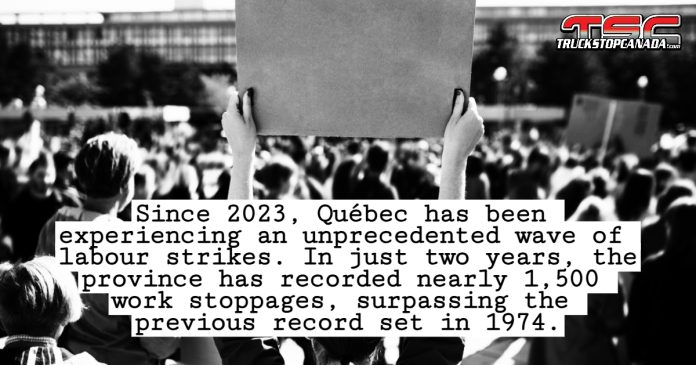Bill 89: Why Québec Has Become Canada’s Strike Capital | Since 2023, Québec has been experiencing an unprecedented wave of labour strikes. In just two years, the province has recorded nearly 1,500 work stoppages, surpassing the previous record set in 1974.
And the trend is not slowing down—378 strikes were already recorded in the first two months of 2025 alone.
While these labour disruptions affect the daily lives of citizens across the province—including truck drivers who rely on ferry crossings, such as those halted by the current strike at the Société des traversiers du Québec (STQ)—what’s particularly striking is how geographically concentrated they are.
Although Québec accounts for just 22% of Canada’s population, it has been the source of nearly 90% of all work stoppages in the country since 2023.
Essential Services, Repeatedly Disrupted
The majority of these strikes have taken place in the public sector, particularly in education, healthcare, social services, early childhood centres (CPEs) and public transit systems. These are critical services where interruptions can severely disrupt daily life:
- Parents unable to send their children to daycare
- Students missing school
- Patients without access to transportation or care
- Workers stranded without reliable public transit
A particularly stark example: a long-standing strike at Notre-Dame-des-Neiges Cemetery in Montréal prevented hundreds of families from burying their loved ones, with human remains stored for months—highlighting the deeply personal impact of these conflicts.
A High Unionization Rate and a Growing Trend
Québec’s public sector unionization rate sits at nearly 85%, significantly higher than the private sector average of 23%. In this context, strikes have become not just a last resort, but increasingly a common strategy in collective bargaining. Analysts from the Montreal Economic Institute (IEDM) describe this trend as the “normalization” of work stoppages.
Bill 89: An Attempt to Regain Balance
In response, Québec’s Labour Minister, Jean Boulet, introduced Bill 89, aimed at protecting the public during strikes and lockouts. The bill proposes two major tools:
- A new framework requiring minimum service levels during labour disruptions in sectors not already covered by essential services legislation.
- In exceptional cases, mandatory arbitration if a strike causes serious or irreparable harm to the public.
However, the bill currently excludes the public and parapublic sectors from some of its provisions—a major oversight, according to many experts, since these are precisely the sectors most frequently affected by labour disputes.
The IEDM and other observers are urging the government to close this loophole in order to restore a more equitable balance between union rights and public protection.
Controversy and Pushback
Unions reacted swiftly, denouncing what they view as an attack on the constitutional right to strike, which is protected under both the Canadian and Québec Charters of Rights and Freedoms. Minister Boulet insists the bill respects these rights and is only meant to intervene in truly exceptional circumstances.
The government has cited several recent events that prompted the legislation:
- Vulnerable children losing access to specialized education services
- Families unable to bury their dead in a timely and humane manner
- Low-income citizens unable to access hospitals due to transit strikes
- A strike by Autobus Transco in Montréal in October 2023 that left 15,000 students without school transportation
The government also highlighted potential economic risks, such as when a strike threatens major public events like the Festival d’été de Québec, which draws hundreds of thousands of visitors.
Bill 89 calls for each case to be assessed individually, with interventions allowed only when the legal threshold of “serious or irreparable harm” is met. Oversight would fall to the Administrative Labour Tribunal (TAT), ensuring a neutral and legally sound process.
A Political and Social Turning Point
With Bill 89, Québec appears to be shifting its approach to labour relations. Whether a fair balance can be struck between protecting union rights and shielding the public from excessive disruption remains to be seen. But one thing is clear: this isn’t just a labour issue anymore. It’s a broader societal concern—one that affects every resident of the province.
A Broader Debate on Union Culture
Québec’s position as Canada’s epicentre of labour strikes also raises broader questions about union dynamics and working conditions in the public sector. In some areas, such as healthcare, special education, and early childhood care, workers are undeniably struggling with staff shortages, underfunding, and excessive workloads—all legitimate reasons to sound the alarm.
But other strikes are harder to justify. Some are launched despite seemingly reasonable employer offers, or are repeated with every new negotiation cycle. While high unionization is not inherently problematic, it can grant disproportionate leverage that, if overused, comes at the expense of the general public.
This is not a call to suppress the right to strike, but rather an appeal for a more balanced, responsible use of union power—especially in a province that alone accounts for 90% of Canada’s recent strikes.
At some point, Québec will need to reassess how to balance worker rights with the collective needs of its citizens.
Read More :
Potential Border Strike This Thursday: Expected Impacts on Trucking Industry
















